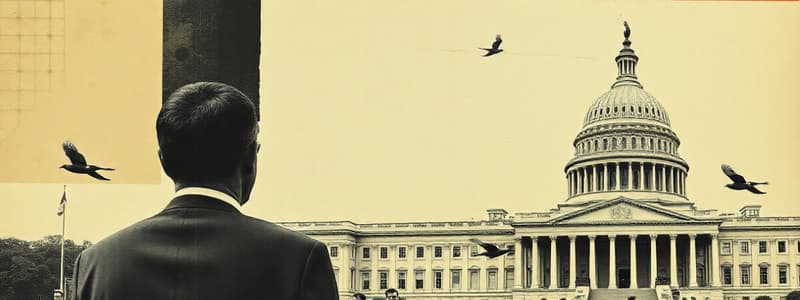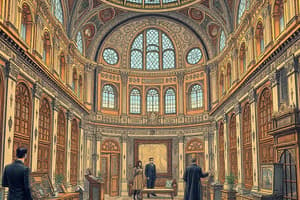Podcast
Questions and Answers
What was the significance of the Brown v. Board of Education decision in 1954?
What was the significance of the Brown v. Board of Education decision in 1954?
- It upheld the constitutionality of Jim Crow laws.
- It mandated the desegregation of private businesses.
- It allowed for separate facilities as long as they were equal.
- It ruled that separate facilities based on race are inherently unequal. (correct)
Which amendment effectively abolished poll taxes in the United States?
Which amendment effectively abolished poll taxes in the United States?
- 15th Amendment
- 24th Amendment (correct)
- 19th Amendment
- 26th Amendment
What was the outcome of the Heart of Atlanta Motel case?
What was the outcome of the Heart of Atlanta Motel case?
- The motel won the right to limit guests to whites only.
- The court ruled that businesses could not discriminate against individuals based on race. (correct)
- Jim Crow laws were upheld.
- Businesses could discriminate based on race.
What did the 19th Amendment accomplish in U.S. history?
What did the 19th Amendment accomplish in U.S. history?
What was the ruling in Korematsu v. United States regarding Japanese internment camps?
What was the ruling in Korematsu v. United States regarding Japanese internment camps?
What is the primary role of bureaucracy in government?
What is the primary role of bureaucracy in government?
Which of the following is an example of an independent executive agency?
Which of the following is an example of an independent executive agency?
What does the term 'spoils system' refer to?
What does the term 'spoils system' refer to?
What is the main purpose of independent regulatory commissions?
What is the main purpose of independent regulatory commissions?
Which amendment abolished slavery in the United States?
Which amendment abolished slavery in the United States?
What aspect of citizenship does the 14th Amendment address?
What aspect of citizenship does the 14th Amendment address?
Which agency is responsible for regulating the amount of pollution allowed from companies?
Which agency is responsible for regulating the amount of pollution allowed from companies?
Which of the following statements about the Federal Reserve is true?
Which of the following statements about the Federal Reserve is true?
Flashcards
Bureaucracy
Bureaucracy
The system by which the executive branch implements policies.
Civil Service
Civil Service
The collective term for the bureaucracy, the group of people who work for the government.
Spoils System
Spoils System
The practice of awarding government jobs to political supporters.
Patronage
Patronage
Signup and view all the flashcards
Independent Executive Agencies
Independent Executive Agencies
Signup and view all the flashcards
Independent Regulatory Commissions
Independent Regulatory Commissions
Signup and view all the flashcards
Government Corporation
Government Corporation
Signup and view all the flashcards
13th Amendment
13th Amendment
Signup and view all the flashcards
Plessy v. Ferguson
Plessy v. Ferguson
Signup and view all the flashcards
Brown v. Board of Education
Brown v. Board of Education
Signup and view all the flashcards
De Jure Segregation
De Jure Segregation
Signup and view all the flashcards
De Facto Segregation
De Facto Segregation
Signup and view all the flashcards
Civil Rights Act of 1964
Civil Rights Act of 1964
Signup and view all the flashcards
Study Notes
Bureaucracy and Financing Government
- Bureaucracy: the way the executive branch implements policies
- Civil service: the bureaucracy
- Spoils system: giving jobs to supporters
- Patronage: the act of giving jobs to supporters
- Independent executive agencies operate outside the executive branch (e.g., NASA)
- Independent regulatory commissions regulate business activities (e.g., FCC)
- Government corporation: a business set up by the government because a private firm would lose money (e.g., delivering mail)
- Fiscal policy: government spending and taxation decisions, determined by Congress
- Monetary policy: decisions about the money supply and interest rates, made by the Federal Reserve
- NASA: responsible for space travel and space shuttles
- SEC: regulates the trading of stocks and bonds
- FCC: regulates public airwaves and technology
- Amtrak: the nation's train system
- USPS: delivers mail
- FDIC: insures bank deposits up to a certain amount
- OSHA: workplace safety
- DNI: synthesizes information between the FBI and CIA
- CPSC: ensures product safety
- EPA: regulates the amount of pollution companies can produce
- FED: controls the money supply
Civil Rights
- Dred Scott v. Sandford (1857): a slave cannot be free; treated like property
- 13th Amendment: banned involuntary servitude (slavery)
- 14th Amendment: birthright citizenship and equal protections clause
- Jim Crow laws: segregation laws
- Plessy v. Ferguson (1896): "separate but equal" facilities were allowed
- Brown v. Board of Education (1954): separate facilities are unequal; ended segregation in public schools
- De jure segregation: segregation by law
- De facto segregation: segregation that happens organically
- Civil Rights Act of 1964: prohibits discrimination in public places
- 15th Amendment: granted African American men the right to vote
- Smith v. Allwright (1944): outlawed all-white primaries
- 19th Amendment: granted women the right to vote
- 24th Amendment: outlawed poll taxes
- Korematsu v. United States (1944): Japanese internment camps were deemed justifiable during wartime
- Reed v. Reed (1971): men and women could not receive different treatment in legal documents
- Defense of Marriage Act 1995: defined marriage as between a man and a woman
Additional Information
- Respect for Marriage Act 2022: redefined marriage as between two consenting adults.
- Heart of Atlanta Motel: this motel was sued for denying service to African Americans; a test case for Civil Rights Act
Studying That Suits You
Use AI to generate personalized quizzes and flashcards to suit your learning preferences.
Related Documents
Description
Explore the intricacies of bureaucracy and how it plays a crucial role in the functioning of government. This quiz covers key concepts such as civil service, independent agencies, fiscal and monetary policies, and notable government corporations. Test your understanding of how these elements contribute to effective governance.




